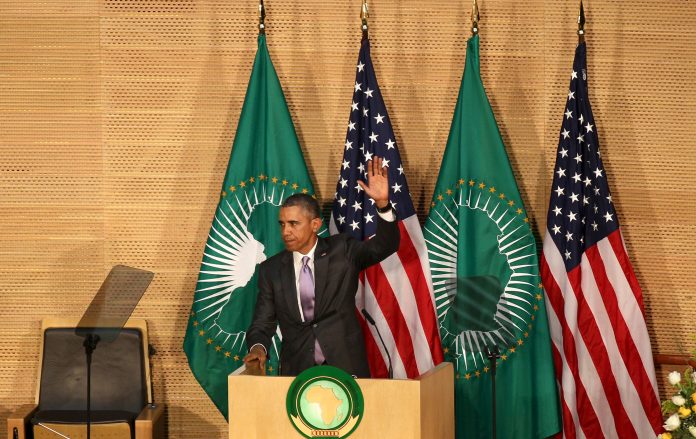President Barack Obama on July 28 delivered “Remarks to the People of Africa” at the headquarters of the African Union in Addis Ababa, Ethiopia, becoming the first U.S. president to address the institution in its 52-year history.
The president’s historic address, which was broadcast across the continent, leveraged his triple-advantage in Africa as a Black man, son of a Kenyan father, and president of the world’s most powerful nation, to underscore America’s commitment to the continent and cement his own administration’s Africa legacy.
“As Africa changes, I’ve called on the world to change its approach to Africa,” he said, according to a copy of his speech circulated by the White House. “As president, I’ve worked to transform America’s relationship with Africa, so that we’re truly listening to our African friends and working together, as equal partners. And I’m proud of the progress that we’ve made.”
While it was a triumphant moment for the United States—not to mention a personal triumph for President Obama, who was applauded more than 50 times during his speech—it may not be enough to dispel the widespread belief on both sides of the Atlantic Ocean that Washington is desperately trying to catch up to China’s investment juggernaut on the continent.
And indeed, President Obama went to the AU with a hard sell for U.S. partnership in expanding intra- and extra-Africa trade and investment. Read a related excerpt of his speech here.
“The choices made today will shape the trajectory of Africa, and therefore, the world for decades to come. And as your partner and your friend, allow me to suggest several ways that we can meet this challenge together,” he said, before outlining U.S. efforts in such areas as modernizing customs and border infrastructures, promoting U.S. trade and investment missions to the continent, building local capacity in agriculture and other key sectors, preparing for and adapting to climate change, and stemming illicit capital outflows. “As you build the Africa you believe in, you will have no better partner, no better friend than the United States of America.”
President Obama began his speech with an appeal to the pride of his listeners, a note he struck several times throughout his speech.
“This is the cradle of humanity, and ancient African kingdoms were home to great libraries and universities. But the evil of slavery took root not only abroad, but here on the continent. Colonialism skewed Africa’s economy and robbed people of their capacity to shape their own destiny,” he said. “It is long past time to put aside old stereotypes of an Africa forever mired in poverty and conflict. The world must recognize Africa’s extraordinary progress. Today, Africa is one of the fastest-growing regions in the world. Africa’s middle class is projected to grow to more than one billion consumers. With hundreds of millions of mobile phones, surging access to the Internet, Africans are beginning to leapfrog old technologies into new prosperity. Africa is on the move, a new Africa is emerging,” the president added.
He continued in language ranging from nostalgic, as he spoke of his Kenyan heritage; to blunt, as he described “economic relationships” that simply are “about building countries’ infrastructure with foreign labor or extracting Africa’s natural resources” and “illicit flows with multinationals;” to urgent, as he pressed for the empowerment of women and girls and investment in youth via education, entrepreneurship support and economic opportunity; to severe, as he condemned conflict, terrorism, the repression of women and girls, and non-democratic governance exemplified by such practices as corruption, human rights abuses, and the refusal of leaders to step aside when their terms end; and even to jocular, as he lamented his own obedience to term limits and the fact that he is “getting old.”
He was equally frank about America’s shortcomings.
“We [speak out about human rights abuses] not because we think our democracy is perfect, or we think that every country has to follow precisely our path. For more than two centuries since our independence, we’re still working on perfecting our union. We’re not immune from criticism,” he said.
President Obama’s visit to Kenya and Ethiopia this week was his fourth to sub-Saharan Africa as a sitting U.S. president. Some contend it may be his last to the continent in that role. As if he believed that to be true, the president over the past few days sought to emphasize his administration’s initiatives with respect to Africa. Certainly his historic appearance at the African Union will go a long way towards defining his Africa legacy.













